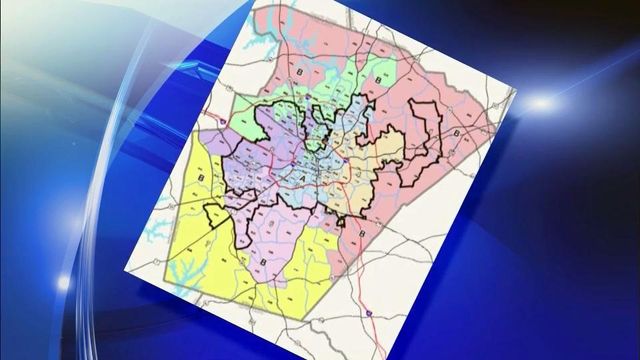Federal judge takes look at Wake voting maps
A federal judge has said he hopes to rule by the end of the month on the legality of voting maps state lawmakers drew for Wake County Board of Education and Board of Commissioner seats.
Posted — UpdatedThe Republican-led General Assembly approved new voting districts for the school board in 2013 after Democrats won control of the nine-member board. The new map consolidates the nine voting districts into seven districts and creates two regional districts, one representing the urban core of the county and the other the rural and suburban outer ring.
The maps had been redrawn just two years earlier, in 2011, by Republican consultant Kieran Shanahan.
This year, lawmakers approved a similar map for the Board of Commissioners – again, after Democrats took control of the board – by adding two regional districts to the seven current seats and changing the voting for those seven seats from countywide to individual districts.
Advocacy groups and several Wake County residents have challenged the maps, arguing that they disproportionately pack minority voters into districts that have more voters than other districts, which makes their votes count less and reduces their influence in surrounding areas.
Sen. Dan Blue, D-Wake, has been a vocal critic of new maps, and he testified in court Wednesday that they were created "with no criteria other than the whims of lawmakers who drew them."
Drawing districts to favor one party or the other is allowed under the law "to a point," Blue said.
"You can't inject race into it to get partisan advantage. That violates the 14th Amendment," he told WRAL News. "When you create two superdistricts that are not equal, and the one that has more people is where you put the minority voters, I think that crosses the line."
The urban regional district includes 10 percent more voters than the rural-suburban one.
Rep. Darren Jackson, D-Wake, said he doubts people from the eastern part of the county that he represents have much in common with residents in other parts of the county that are in the same regional district.
"I would be surprised if a lot of people from Brier Creek had ever been out in my area,” Jackson said on the stand.
He said he offered amendments to the maps because he didn’t think they accomplished the stated goals of keeping communities together and cutting the cost of campaigning, but they were all rebuffed by the GOP majority in the House.
Rep. Rosa Gill, D-Wake, a former school board chairwoman, said there was no valid reason to redraw the maps.
"The only reason that I can think is so that (Republicans) can assure themselves that they can possibly get a majority of both the school board and the county commissioners," Gill said.
School board member Bill Fletcher, a Republican, said lawmakers have frequently targeted the board in recent years with proposals on everything from voting districts to who controls school construction.
"It's supposed to be a nonpartisan board. We were there for the kids," Fletcher said.
The Wake County Board of Elections is the lone defendant in the case. Although the board had nothing to do with drawing the maps, it is in charge of implementing them. So, a federal appeals court decided the board should be sued over them, rather than state lawmakers.
"Here we are having to defend a lawsuit in which we had no say over. We as a board don’t really like that," said county elections board Chairman Brian Ratledge.
Candidate filing for the 2016 elections is open until next Monday, but the two regional Board of Commissioner seats are the only ones that might be affected by a ruling in the case.
The new maps don't take effect until 2018 for the rest of the Board of Commissioners, so the three seats up for election next year will be voted on countywide as usual. School board elections are nonpartisan, so candidates for those seats don't file until next summer for the November election.
Related Topics
• Credits
Copyright 2024 by Capitol Broadcasting Company. All rights reserved. This material may not be published, broadcast, rewritten or redistributed.






